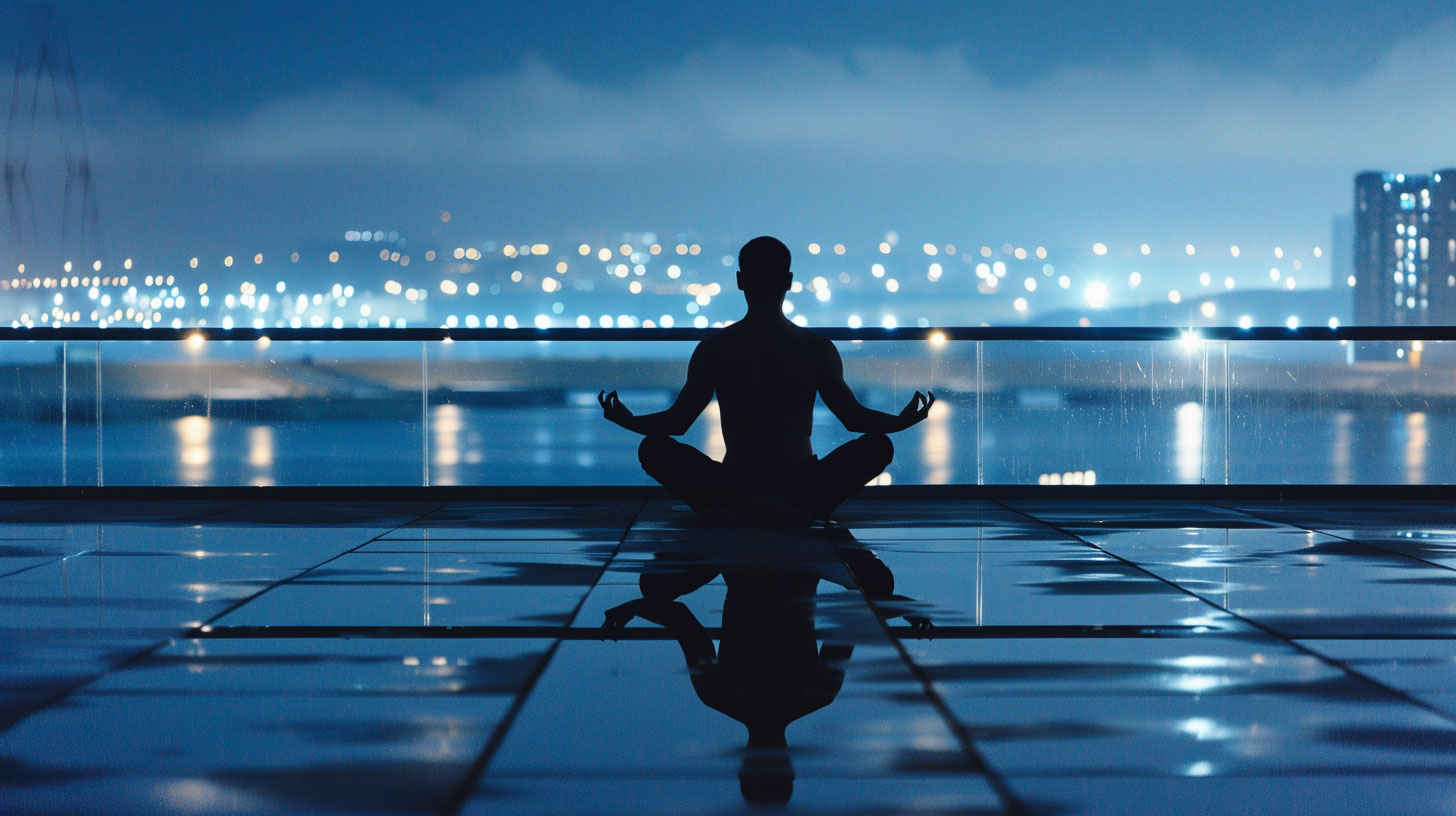Understanding Anxiety and Meditation
As we navigate today’s fast-paced world, anxiety has become a common companion for many of us. Our minds, caught in a web of worries and fears, often find little respite. Yet, there is a powerful ally available to us in the form of meditation—a practice that can help us find calm and balance in the midst of our chaotic lives.
The Connection Between Mind and Anxiety
Anxiety is a natural response to perceived threats and stressors, but when it becomes chronic, it can disrupt our daily functioning and overall quality of life. At its core, anxiety is a manifestation of the mind’s reaction to stress, with our thoughts and emotions playing a pivotal role in its intensity and duration.
The mind’s tendency to dwell on past events or worry about future outcomes can trap us in a cycle of anxiety. It is in understanding this intricate connection between our thoughts and feelings that we begin to see how managing our mind can be instrumental in addressing anxiety.
How Meditation Addresses Anxiety
Meditation for anxiety is not just a temporary fix; it’s a transformative practice that addresses the root causes of anxiety. Studies, such as the one highlighted by Mindful, have demonstrated that engaging in mindfulness-based stress reduction (MBSR) for eight weeks can lead to significant reductions in anxiety levels. This form of mindfulness meditation trains us to observe our thoughts without judgment, reducing reactivity to negative patterns and emotions.
Research indicates that consistent meditation can alter brain regions linked to memory, learning, and emotion regulation (Mindful). These changes include a reduction in amygdala reactivity—commonly associated with anxiety—and strengthened connections between the amygdala and prefrontal cortex, leading to improved emotional control.
Meditation encourages a shift in brain activity from the stress-prone right frontal cortex to the calmer left frontal cortex, fostering a state of relaxation and decreased anxiety. Moreover, meditative practices like deep breathing, guided meditation, and body scans serve as tools that aid in managing anxious thoughts and grounding us in the present moment.
Even brief daily sessions, lasting 10-15 minutes, can have a positive impact on anxiety (Calm). As we develop our meditation practice, we enhance our self-awareness, allowing us to recognize the signs of stress and anxiety early and more effectively manage these feelings.
By integrating meditation into our lives—whether through transcendental meditation, breathwork, or mantra repetition—we empower ourselves to take control of our mental state. The journey to overcome anxiety begins in the mind, and meditation offers us the tools to break free from its grasp and embrace a more peaceful and balanced existence. For those new to meditation, helpful resources can be found in meditation for beginners, and meditation apps can provide accessible ways to start incorporating meditation into daily routines.
The Science Behind Meditation
In our exploration of mental well-being, we often encounter meditation as a pivotal tool for managing anxiety. Understanding the scientific mechanisms can empower us with a deeper appreciation for this ancient practice and its relevance in modern mental healthcare.
Brain Changes with Mindfulness
Mindfulness meditation has shown to elicit significant changes in the brain, particularly in regions associated with memory, learning, and emotional regulation. This is promising for those of us grappling with anxiety, as these changes can contribute to a more balanced mental state. A pivotal study found that after eight weeks of Mindfulness-Based Stress Reduction (MBSR), participants with anxiety disorders exhibited noticeable reductions in their anxiety levels.
The neurological underpinnings of mindfulness reveal that consistent practice can alter the brain’s neuroplasticity, rewiring our responses to stress and anxiety. This can lead to increased psychological well-being, as we develop a more curious and open attitude towards the symptoms of anxiety. Moreover, mindfulness enhances self-awareness, enabling us to identify signs of stress and anxiety early on, thereby improving our ability to manage them (Mindful).
The Role of Breathwork in Calm
The act of focusing on our breath is a cornerstone of many meditative practices and plays a critical role in fostering calmness. Engaging in breathwork can ground us in the present moment, providing a respite from the often overwhelming sensations associated with anxiety. Techniques such as the 4-7-8 breathing exercise can be particularly effective in calming the mind and reducing anxiety levels, promoting a greater sense of well-being (Forbes).
Regular meditation, inclusive of breathwork, can help rewire the brain to lean towards positive experiences and diminish the tendency to ruminate on negative thoughts. This cognitive shift is particularly beneficial for those of us who experience heightened anxiety, as it helps to navigate and control our thoughts and emotions more effectively (Forbes).
By incorporating meditative practices into our routines, we can potentially alleviate symptoms of various anxiety disorders such as panic disorder, social anxiety disorder, and generalized anxiety disorder. The consistent and deliberate act of meditating, paired with the conscious regulation of breath, can serve as a powerful intervention for managing anxiety (BetterHelp).
For those of us beginning our meditation journey, understanding these scientific insights can be highly motivating. As we delve deeper into various practices like mindfulness meditation, guided meditation, or transcendental meditation, we can do so with the assurance that our efforts are grounded in a solid scientific foundation. And for those seeking additional resources, exploring meditation apps or considering participation in meditation retreats can offer further support and guidance on this path to mental tranquility.
Types of Meditative Practices
In our quest to alleviate anxiety, we come across various meditative practices that can aid in our journey towards mental wellness. Here we will explore several types of meditation, each with the potential to help us manage and reduce anxiety.
Mindfulness-Based Stress Reduction (MBSR)
Mindfulness-Based Stress Reduction (MBSR) is a structured program that combines mindfulness meditation and yoga. Developed by Dr. Jon Kabat-Zinn, MBSR is designed to help individuals become more aware of their thoughts, feelings, and bodily sensations in a nonjudgmental way. This mindfulness practice encourages us to focus on the present moment, which can significantly reduce symptoms of anxiety, especially in those with generalized anxiety disorder (NCCIH).
To get started with MBSR, we can look for local classes or online programs that provide structured training. By dedicating time each day to practice, we can develop a deeper sense of calm and clarity.
Guided Meditation and Breathwork
Guided meditation involves being led through a meditation session by an instructor. This can be highly beneficial for beginners or those of us who find it challenging to direct our own meditative practices. The guidance can come through in-person sessions, recordings, or even meditation apps. Guided meditation often includes breathwork, which focuses on deep breathing exercises to reduce stress and anxiety (BetterHelp).
We can enhance our guided meditation practice by incorporating meditation music or attending guided meditation sessions specifically designed for relaxation and meditation for sleep.
Mantra and Transcendental Meditation
Mantra meditation involves the repetition of a word or phrase, known as a mantra, to help focus the mind and enter a deeper state of relaxation. This practice can be particularly helpful for those of us who struggle with anxiety, as the repetition of mantras can provide a sense of comfort and stability (BetterHelp).
Transcendental Meditation (TM) is a form of mantra meditation that involves silently repeating a personalized mantra in a specific way. It has garnered attention for its potential to reduce anxiety and symptoms of PTSD. For those interested in learning more about this particular practice, it’s beneficial to explore transcendental meditation courses or programs offered by certified instructors.
By exploring these meditative practices, we can find the ones that resonate most with our personal needs and lifestyle. Whether it’s through MBSR, guided meditation with breathwork, or mantra repetition, each practice offers a pathway to tranquility. As we continue on our meditation journey, we can also consider attending meditation retreats or learning more about meditation for beginners to further enhance our experience. The key is to remain patient and open to the transformative benefits of meditation, trusting in its power to soothe our anxious minds.
Starting Your Meditation Journey
Embarking on a meditation journey can be transformative, particularly when tackling the challenges of anxiety. Let’s explore how we can establish a consistent practice, which techniques are suitable for beginners, and how to weave meditation into the fabric of our daily lives.
Creating a Consistent Practice
Consistency is key when it comes to meditation for anxiety. Research shows that regular meditation can decrease symptoms of anxiety and contribute to overall well-being (Calm). To build a consistent practice:
- Set a Specific Time: Choose a time of day that works best for you, whether it’s morning, afternoon, or evening.
- Start Small: Even 10-15 minutes a day can make a significant difference in anxiety levels.
- Create a Comfortable Space: Find a quiet spot where you won’t be disturbed.
- Use Reminders: Set alarms or notifications to remind you it’s time to meditate.
- Track Your Progress: Keep a journal or use meditation apps to monitor your journey and stay motivated.
Consistent practice is more beneficial than sporadic long sessions. Our focus should be on building the habit first, then extending the duration of our practice as it becomes a natural part of our routine.
Techniques for Beginners
For those of us just starting out, simple meditation techniques can help ease the process and encourage persistence:
- Focus on the Breath: Practice abdominal breathing to engage the body’s relaxation response (Verywell Mind).
- Guided Meditations: Follow a guided meditation to be led through the process by an experienced practitioner.
- Mindfulness Meditation: Start with mindfulness meditation, which involves being present and aware of your surroundings and sensations.
- Use Meditation Aids: Consider using meditation music to help focus your mind and create a tranquil environment.
By exploring different techniques, we can find what resonates with us and brings the most benefit to our mental state.
Incorporating Meditation into Daily Life
Meditation doesn’t have to be a separate part of our day; we can integrate it into our daily activities to enhance its impact on our life:
- Mindful Eating: Take the time to savor your food, paying attention to the taste, texture, and aroma.
- Walking Meditation: Use a walk to focus on your breath and the sensation of your feet touching the ground.
- Meditative Breaks: Replace coffee breaks with a few minutes of deep breathing or meditation for sleep if you’re feeling overwhelmed.
- Regular Check-ins: Pause throughout the day to check in with your breath and body sensations.
By weaving meditation into the fabric of our day, we can maintain a calm and centered state, making it easier to manage anxiety and stress.
Starting a meditation practice may seem daunting, but with the right approach and techniques, it can become a valuable tool in our mental health toolkit. As we continue to practice, we may notice the benefits of meditation extending beyond reduced anxiety to improved physical health and long-term mental improvements. For those looking to deepen their practice, meditation retreats can offer a more immersive experience. Remember, the journey of meditation is personal and adaptable to our unique needs and lifestyle.
Overcoming Challenges in Meditation
As we embrace the practice of meditation for anxiety, it’s not uncommon to encounter hurdles along the way. Recognizing these challenges and knowing how to navigate them can enhance our meditation experience and make it more effective in managing anxiety.
Common Obstacles and Solutions
While embarking on our meditation journey, we may come across several common barriers. These can range from internal struggles like restlessness and doubts to external distractions like noise or interruptions.
| Obstacle |
Solution |
| Difficulty Concentrating |
Start with short sessions and gradually increase duration. |
| Restlessness |
Use movement meditations like walking or yoga to ease into stillness. |
| Lack of Time |
Schedule specific times for meditation or integrate it into daily activities like commuting. |
| Boredom |
Experiment with different forms of meditation, such as transcendental meditation or guided meditation. |
| External Distractions |
Create a dedicated meditation space and use noise-cancelling headphones or meditation music. |
| Doubt or Frustration |
Remind yourself of the benefits of meditation and seek out success stories for motivation. |
By addressing these issues with practical solutions, we can remain committed to our practice and continue to reap the calming benefits that meditation offers. For those just starting out, consider exploring meditation for beginners to find guidance tailored to novice practitioners.
Building a Supportive Environment
Creating a supportive environment is essential for a sustainable and effective meditation practice. This involves both the physical space and the community or resources we surround ourselves with.
- Designate a Quiet Space: Choose a spot in your home that is quiet and comfortable for meditation. This space should be free from distractions and allow you to relax fully.
- Gather Supportive Tools: Equip your meditation space with items that encourage relaxation, such as cushions, calming scents, or soft lighting. Utilizing meditation apps can also provide structure and guidance.
- Establish a Routine: Consistency is key. Try to meditate at the same time each day to establish a routine that becomes a natural part of your life.
- Join a Community: Connect with others who practice meditation. Online forums, local groups, or meditation retreats can offer support and deepen your practice.
- Educate Yourself: Continue to learn about meditation. Reading books, listening to podcasts, or attending workshops can provide new insights and keep you engaged.
- Prioritize Your Practice: Treat meditation as an essential part of your day. Just as you would not skip a meal or sleep, ensure meditation remains a priority for your well-being.
By fostering a supportive environment, we can overcome the challenges that arise and maintain a meditation practice that not only alleviates anxiety but also enhances overall mental health. Whether it’s through mindfulness meditation, incorporating meditation into your nightly routine with meditation for sleep, or any other form, the supportive environment we build will be the foundation of our meditation journey.
The Impact of Meditation on Health
Meditation has long been known to provide a plethora of health benefits, especially when it comes to mental well-being. But its impact extends beyond the mind, offering physical benefits that can enhance our overall quality of life. In this section, we’ll delve into how meditation can help alleviate anxiety and contribute to long-term mental health improvements.
Physical Benefits of Reduced Anxiety
When we engage in regular meditation practices like mindfulness meditation, we’re not just calming our minds—we’re also positively affecting our bodies. For those of us grappling with anxiety, meditation offers a natural and effective way to lessen its physical manifestations.
A study highlighted by Mindful revealed that after eight weeks of mindfulness-based stress reduction (MBSR), participants reported significant reductions in anxiety levels. This is indicative of meditation‘s capacity to improve various physical symptoms associated with anxiety, such as:
- Decreased heart rate
- Lowered blood pressure
- Reduced levels of stress hormones
- Improved sleep quality, which can be further explored through meditation for sleep
By reducing these physical anxiety symptoms, meditation helps us establish a more balanced and harmonious physiological state.
Long-Term Mental Health Improvements
The mental health benefits of meditation, particularly for anxiety, are well-supported by research. Mindfulness meditation not only helps individuals manage their immediate anxiety symptoms but also contributes to long-lasting mental health improvements.
According to Forbes, regular meditation practice empowers individuals to navigate their thoughts and emotions more effectively, fostering a greater sense of control and self-awareness. This enhanced self-awareness is key to recognizing and addressing signs of anxiety and stress early on.
Moreover, mindfulness principles have been integrated into various therapeutic interventions such as Dialectical Behavioral Therapy (DBT) and Acceptance and Commitment Therapy (ACT), as well as within cognitive-behavioral therapy (CBT) for emotional disorders, amplifying their effectiveness.
Research from the Harvard Gazette shows that meditation can lead to changes in brain regions associated with memory, learning, and emotional regulation. These changes include decreased activity in the amygdala, the brain’s stress and anxiety processing center, which correlates with a reduction in symptoms of anxiety and depression.
For those of us starting our meditation journey, there are many resources available to help, including meditation apps, guided meditation, and even meditation retreats. As we explore meditation for beginners, it’s important to remember that the journey is a personal one, and finding the right practice for our individual needs is key to reaping the full benefits of meditation.
In conclusion, the health impacts of meditation, and specifically its role in managing anxiety, are profound and multifaceted. By incorporating regular meditative practices into our lives, we can experience significant improvements in both our physical well-being and long-term mental health.
FAQs (Frequently Asked Questions)
How does meditation help with anxiety? Meditation helps manage anxiety by training the mind to observe thoughts without judgment, reducing reactivity to negative patterns and emotions. It can alter brain regions linked to emotion regulation, decrease amygdala reactivity, and shift brain activity towards relaxation.
Can meditation lead to physical health benefits? Yes, regular meditation can reduce physical symptoms of anxiety, such as decreased heart rate, lowered blood pressure, and improved sleep quality. It fosters a balanced physiological state.
What are some effective meditation techniques for anxiety? Techniques like Mindfulness-Based Stress Reduction (MBSR), guided meditation, breathwork, and mantra repetition are effective. Each offers a unique approach to fostering calm and reducing anxiety symptoms.
How can I start a meditation practice for anxiety? Begin with simple techniques like focusing on the breath or using guided meditations. Start with short sessions, create a comfortable space, and try to meditate at the same time daily to build a consistent practice.
What challenges might I face when starting meditation and how can I overcome them? Common obstacles include difficulty concentrating, restlessness, and external distractions. Solutions include starting with short sessions, using movement meditations, scheduling meditation into your daily routine, and creating a dedicated space for practice.




